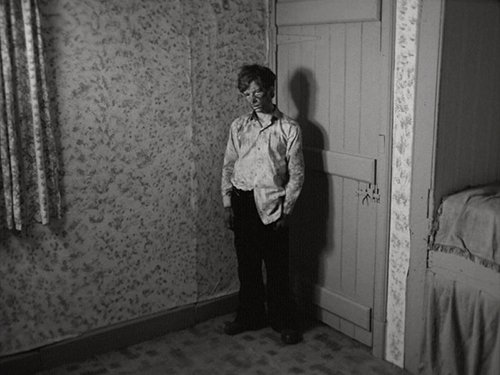
Jamie leaves the children’s home to live with his paternal grandmother. After working in a mine and in a tailor’s shop, he is conscripted into the RAF, and goes to Egypt, where he is befriended by Robert, whose undemanding companionship releases Jamie from self-pity.
“I sat in my room in front of the typewriter wondering what I could write. Adaptations of present day novels or plays were out of the question on account of cost. I rejected period pieces as too ambitious and costly for a beginner like myself. And so I wrote about my childhood. Strangely enough, my trilogy is not about a dream world, but about the real landscape I had wanted so badly to escape from. But the making of these films, financed by the British Film Institute, could not be a cathartic exercise. There had to be a distance. I had to be objective so that the characters could come to life, so that the work could have shape. Good work cannot succeed unless the creator feels compassion. He can only begin when the self is put into perspective, when he has fixed a point of view. Chekhov put it better than I: ‘I can write only from memory, I never write directly from life. The subject must pass through the sieve of my memory, so that alone what is important or typical remains there as on a filter.’ It is as simple as that.”
Bill Douglas1
“In My Way Home he returns temporarily to the mining village, makes his first awkward efforts at earning a living in Edinburgh, is briefly adopted by a foster parent, runs away, and then during his National Service is befriended by Robert, an Englishman from a very different class and educational background. Towards the end of the film there is a brief exchange beneath a poster advertising the Hollywood film Niagara (1952), in which Robert, having been asked what he’ll do ‘when you get back?’ says, ‘What about you?’ Jamie replies, ‘I want to be an artist,’ pauses to think, then continues, ‘Maybe even a film director.’”
Guy Barefoot2
- 1Bill Douglas, “Palace of Dreams: The Making of a Filmmaker,” The Bill Douglas Cinema Museum, 1978, coyright: The Estate of Bill Douglas.
- 2Guy Barefoot, “Autobiography and the Autobiographical in the Bill Douglas Trilogy,” Biography, Volume 29, Number 1, Winter 2006, 14-29.

